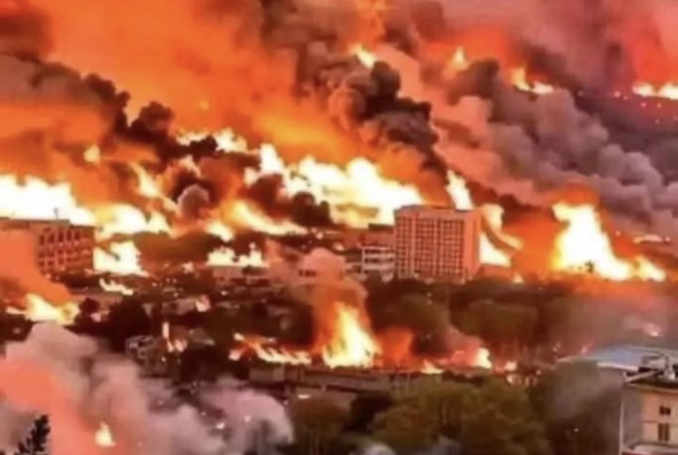‘Largest wildfires in Israel’s history’ – Everything you need to know

Uncontrolled fires sweep through central Israel, exposing environmental risks, political failures, and gaps in emergency response.
The Israeli Fire and Rescue Authority announced on Thursday May 1, 2025 that 119 firefighting crews were continuing to battle wildfires in the Jerusalem mountains, covering 11 sectors, Israeli media reported.
These sectors reportedly include: Sha’ar HaGai, Masilat Zion, Netaf, Yad Hashmonah, Nafeh Ilan, Mavo Hauron, Canada Park, Anaba up to Latrun, Nafeh Shalom, Burma Road to the Ashkelon Forest, and Beit Meir and Shoresh.

The fire service also confirmed the evacuation of seven settlements due to the ongoing fires.
Human and Material Damage
Israeli media reported that 17 firefighters were injured while attempting to tackle the fires, raising the total number of injuries to at least 30.
Additionally, 15 large planes and fire crews from the Israeli Air Force’s various bases participated overnight in efforts to extinguish the flames.
According to the Israeli news site Walla, Canada Park was almost completely destroyed by the fire, and Route 1, the main highway connecting Jerusalem and Tel Aviv, remained closed. Over 100 cars were abandoned by their owners due to the fire.
‘Largest Wildfires in Israel’s History’
Eliyahu Levi, Operations Officer of the Jerusalem District in the Israeli Police, stated that police were guarding the abandoned cars to prevent theft.
The Israeli police also closed roads including Route 3, and Routes 65, 70, and 85. According to Walla, the fire, which has been ongoing since 10 AM on Wednesday, is considered “one of the largest wildfires in Israel’s history.”
The fires led to the cancellation of the annual torch-lighting ceremony and most events related to the so-called “Independence Day.”
The Jewish National Fund in Israel estimated that this fire is one of the largest Israel has faced, destroying around 24,000 dunams of land.
Fear of Fire Regeneration
As the fire service and rescue authorities in Israel expect the arrival of eight planes with firefighting support from Cyprus, Italy, and Croatia, there are concerns that the fires may reignite.
The head of the Jerusalem District in the Fire Service noted that the winds are expected to pick up, potentially restarting the fires.
According to Israeli fire services and the so-called Jewish National Fund, by 2 PM today, the window for controlling the blaze would close, with strong winds anticipated to reignite the fires between 4 PM and 7 PM.
Investigation into Causes
The Israeli internal security agency, Shin Be, is involved in investigating the cause of the fires.
Security sources suggest it is still too early to determine whether the fires were the result of “nationalist motives”.
A suspect was arrested in Jerusalem, though it remains unclear whether they are connected to the fires.
Meanwhile, Yair Netanyahu, the son of the Israeli Prime Minister, stirred controversy by promoting a conspiracy theory, claiming that the fires were deliberately set by the left-wing as part of a plot.
Ongoing Investigations
The Israeli news outlet Times of Israel reported that the vast majority of wildfires in Israel are caused by humans, often due to negligence.
The website also pointed out that Israel is experiencing a long, hot, and dry summer, conditions conducive to forest fires. Significant wildfires have been reported in Israel in 1989, 1995, 2010, 2015, 2019, 2021, and 2023.
A report from the State Comptroller’s Office in July 2024 revealed that the Israeli Fire and Rescue Service had only investigated the causes of about 9% of the fires they dealt with in 2022, and 14% in 2023. Over 50% of the investigations opened between 2020 and 2022 remained unresolved after a year.
Following the fires, the Fire and Rescue Authority raised its alert level to the highest.
On Wednesday, Israel’s Broadcasting Corporation (KAN) confirmed that over 10,000 people had been evacuated due to the fire, and the flames had surrounded military bases, train stations, and major highways.
Exchange of Blame
Security sources, speaking to Israel’s Channel 12, criticized the police and fire services, stating that they “failed, and there is a complete lack of understanding.”
They also noted that these agencies had ignored warnings from the army regarding the potential for fires that day.
At the same time, extremist Israeli National Security Minister Itamar Ben Gvir was criticized for allegedly obstructing the purchase of firefighting helicopters that could have helped in managing the major fire.
Israel’s large-scale planting of European pine trees, which are not native to the region, as part of efforts to reshape the landscape and cover depopulated Palestinian villages, has significantly increased the vulnerability of the region to wildfires.
Unlike native Mediterranean plants, these pines are highly flammable, with resinous wood and dense needle litter that ignites easily under dry, hot conditions.
With climate change exacerbating heatwaves and droughts, these monoculture forests have become tinderboxes, fueling uncontrollable fires and threatening both ecosystems and surrounding communities.
Source: Palestine Chronicle









